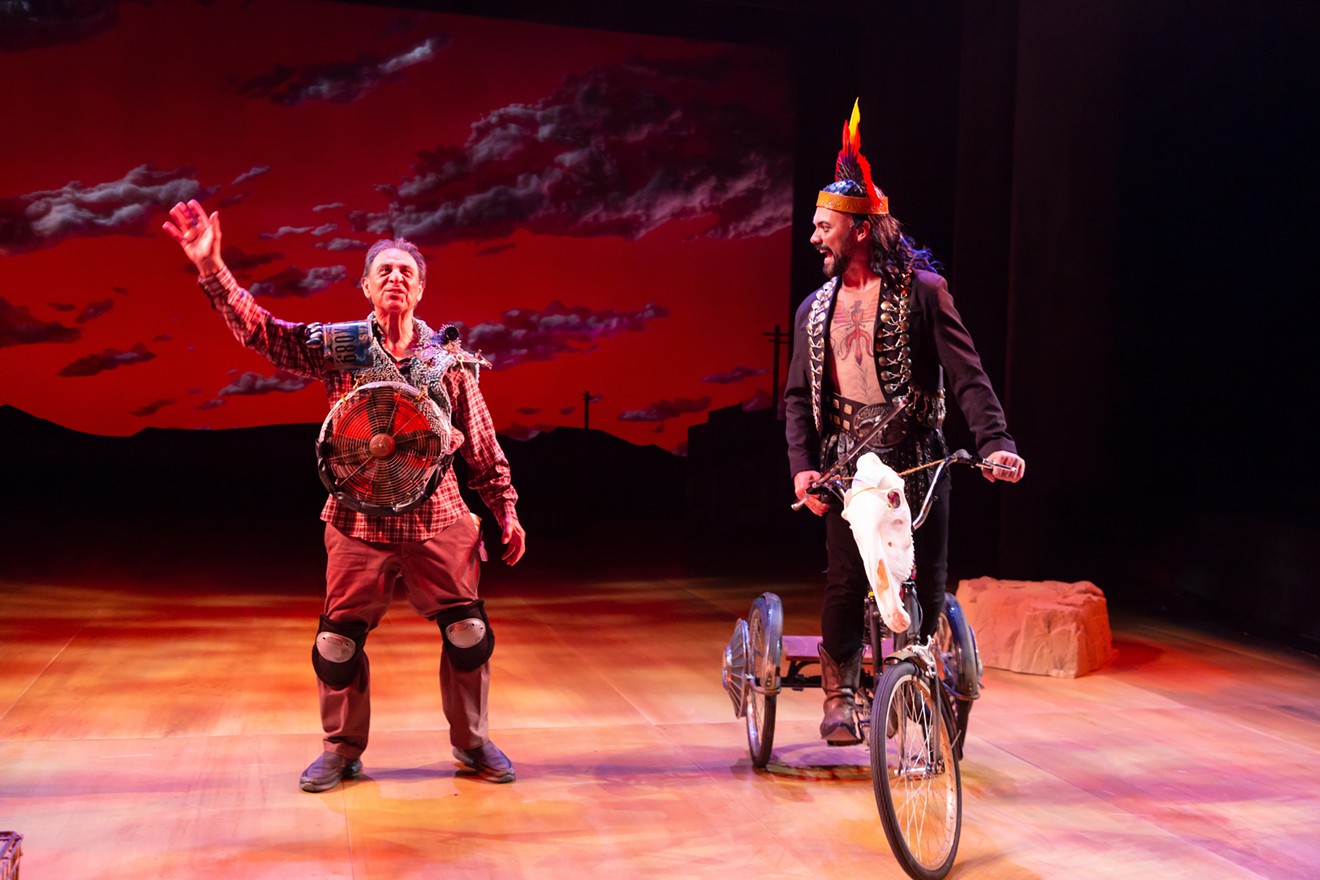Jose Quijano lives in two different worlds. In truth, he’s a retired literature professor suffering from worsening dementia, dependent on his sister and niece to care for him. In his imagination/tenuous grasp on reality, he’s Don Quixote, hero of one of his favorite works of literature.
In real life, he’s headed to a nursing home. In his head, and via a stealthy escape from his caregivers, he’s Quixote, on an epic quest, across vast lands, guided by justice, chivalry and his long-lost love.
Add to the mix that all the above action takes place in the modern-day border city of La Plancha, Texas, and you have the set up for Octavio Solis’ new play, Quixote Nuevo, a reimaging of Miguel de Cervantes’ iconic 1605 novel, now on stage at the Alley Theatre in co-production with Huntington Theatre Company in Boston and Hartford Stage in Connecticut.
It's a bittersweet effort, one that in some way mirrors the duality its central character faces. There's the grand hope and imagination of the work, and then there's the end result. One is something to celebrate, the other sadly doesn’t quite hold up.
The list of what to cheer for is long, and to be clear, in many ways, what shines in this production is nothing short of a long-overdue miracle.
A new, modern play by a Latino writer on the Alley main stage. Not in the basement where the artsy/cool shows are staged. The big house, where the audience’s jewels often shine as bright as the stage lights. We’ve been waiting a long time for this — for a show that looks like, and tells the stories of Houston's largest non-white population.
Equally exciting is that these modern Latino characters speak (and even sing) as often in colloquial Spanish as in English. As they actually would. Don't know the language? Tough, you'll get the gist. More than that I'd say. Trust me, if this Canadian, with less than zero knowledge of Spanish can follow along, anyone can. And from the peals of laughter heard whenever a Spanish punchline was thrown out, it’s obvious many in attendance were thrilled that a dual language approach was taken.
Two standouts in the cast must also be mentioned, albeit for different reasons.
The last time many of us saw Emilio Delgado, our hero Jose, was when he was falling in love with Maria on Sesame Street. Yup, this Delgado was that Luis. I'll pause a moment to let the woosh of warm happy nostalgia wash over those readers old enough to remember.
At almost 80, Delgado may not be running up and down any streets (Sesame or otherwise), but between the still present twinkle in his eye and a physical performance (including being punched unconscious several times) that has him on stage in darn near every scene during the almost two and a half-hour play, you gotta give a man credit where it's due. He's there to put on a show.
But without question, the actorly reason to see this production is for Juan Manuel Amador's splendidly comedic Manny Dias/Sancho Panza. Like Cervantes' original Sancho, Manny is recruited by Quixote to be his scribe. To follow him on his deluded quest and provide support along the way. Amador's blend of slapstick (his many variations of disheveled hair illustrating what befalls him) and his touching teeter-totter between trying to care for the old man and buying into his fantasy, makes him the heart of the production.
With all these wonders, it feels almost ungrateful to point out the tonal and narrative misfires that ultimately render this show thematically incongruent.
Whereas the classic Quixote was comic in a satirical manner Quixote Nuevo is easy humor all the way.
As Jose gets himself into ridiculous situations that pit his delusions of grace against boorish behavior, we’re bombarded with boob jokes, erection jokes, poop jokes, puke jokes, and fart jokes. Frankly, it's surprising there isn't a kick to the balls gag given the sophomoric nature of the humor in the show.
Even scenes that incorporate modern touches into the text play like low hanging fruit. We get setups and punch lines identifiable from a mile away. Alone in the desert after another battle defeat, Quixote bemoans, “My head is throbbing, my feet are cold, I’ve lost my bearings. And I don’t even have my Life Alert”
Sure, this kind of laugh goes down easy, and will undoubtedly please a certain kind of audience. But those of us wishing for something more sophisticated or complex are out of luck.
More concerning, however, is how this type of humor clashes with other elements of the play. What makes these kinds of soft-peddle laughs so jarring is that they're juxtaposed against several attempts to be deadly serious. Solis uses his border town location to include scenes dealing with police harassment, drone surveillance, a Romeo and Juliette forbidden love, and the horrific reality of migrants fleeing violent regimes, only to be turned away by the United States.
It’s not that these situations lack narrative gravitas, but sandwiched up against moment after moment of yuk yuk humor, and without any type of creative transition, they lose impact.
What is it that Quixote Nuevo wants to be? It’s not that it has to chose between being funny and serious, but for the play to move past its mediocre balance at present, it needs to find a way to bring these two sides together in a more fluid manner.
Fluidity is also an issue for director KJ Sanchez who is asked to illustrate both a man's inner spiral into dementia and stage an epic journey. Unfortunately, neither is realized in a compelling manner.
A low hum and a lighting change are all we're given to indicate the start of Joe's hallucinations. Sometimes a chorus of demon angels are present, sometimes just Papa Calaca (Hugo E Carbajal), a kind of stealer of intellectual reality. But even with these characters, the transitions feel slapdash.
More problematic is the endless questing by Quixote/Sancho and the searching for them by the pair's families. Unlike many productions on this stage at the Alley, Quixote Nuevo isn't accompanied by a grand set to help populate the action. Instead, we get a backdrop of clouds and mountains and the occasional/forgettable set-piece trod out.
All this to say that the cast is left to run round in circles, looking out into nothing, waiting for something or someone to appear to enliven the action. And other than a terrific scene involving a stampede of sheep (the unquestionable highlight of the production), Sanchez visually gives us very little to be excited by.
In the end, Jose figures out a way to marry his reality with his fantasy. Enough to give him peace. My hope is this promising production also finds a way to better combine its elements so that we too feel like everything this show has to offer is firing on all fronts.
Quixote Nuevo continues through February 9 at Alley Theatre, 615 Texas. For information, call 713-220-5700 or visit alleytheatre.org. $30-$91.
Support Us
Houston's independent source of
local news and culture
account
- Welcome,
Insider - Login
- My Account
- My Newsletters
- Contribute
- Contact Us
- Sign out

Emilio Delgado and Hugo E. Carbajal in Quixote Nuevo
Photo by T. Charles Erickson.
[
{
"name": "Related Stories / Support Us Combo",
"component": "11591218",
"insertPoint": "4",
"requiredCountToDisplay": "4"
},{
"name": "Air - Billboard - Inline Content",
"component": "11591214",
"insertPoint": "2/3",
"requiredCountToDisplay": "7"
},{
"name": "R1 - Beta - Mobile Only",
"component": "12287027",
"insertPoint": "8",
"requiredCountToDisplay": "8"
},{
"name": "Air - MediumRectangle - Inline Content - Mobile Display Size 2",
"component": "11591215",
"insertPoint": "12",
"requiredCountToDisplay": "12"
},{
"name": "Air - MediumRectangle - Inline Content - Mobile Display Size 2",
"component": "11591215",
"insertPoint": "4th",
"startingPoint": "16",
"requiredCountToDisplay": "12"
}
,{
"name": "RevContent - In Article",
"component": "12527128",
"insertPoint": "3/5",
"requiredCountToDisplay": "5"
}
]
KEEP THE HOUSTON PRESS FREE...
Since we started the Houston Press, it has been defined as the free, independent voice of Houston, and we'd like to keep it that way. With local media under siege, it's more important than ever for us to rally support behind funding our local journalism. You can help by participating in our "I Support" program, allowing us to keep offering readers access to our incisive coverage of local news, food and culture with no paywalls.
Jessica Goldman was the theater critic for CBC Radio in Calgary prior to joining the Houston Press team. Her work has also appeared in American Theatre Magazine, Globe and Mail and Alberta Views. Jessica is a member of the American Theatre Critics Association.
Contact:
Jessica Goldman
Trending Arts & Culture
- Fallout Successfully Makes the Transition From Video Game to Streaming Show
- The 10 Best And Most Controversial Hustler Magazine Covers Ever (NSFW)
- Love is in the Alley's Charming Production of Brontë Classic Jane Eyre
-
Sponsored Content From: [%sponsoredBy%]
[%title%]

Don't Miss Out
SIGN UP for the latest
arts & culture
news, free stuff and more!
Become a member to support the independent voice of Houston
and help keep the future of the Houston Press FREE
Use of this website constitutes acceptance of our
terms of use,
our cookies policy, and our
privacy policy
The Houston Press may earn a portion of sales from products & services purchased through links on our site from our
affiliate partners.
©2024
Houston Press, LP. All rights reserved.





